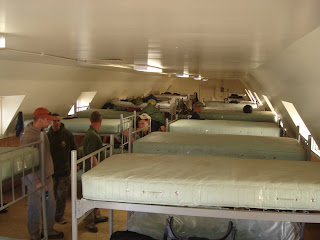My next mission for work is to the eastern foothills of the Himalayas in India (more about that in a future post). As a result some of us who are going on the mission were sent out to the Big Island of Hawaii for training in basic climbing/mountaineering techniques and high altitude conditioning.
We flew out to the Big Island last Thursday and drove up to the Pohakuloa Training Area, an army installation in the saddle between Mauna Kea and Mauna Loa at about 6000'. We spent Thursday afternoon and all day Friday going over basic climbing techniques including knots, ascending a fixed line, rappelling, belaying, etc... In the evenings were had classes on altitude induced illnesses. We also went out for two short hikes.
Tying knots on the rope corral.
Saturday morning we drove up to the Onizuka Visitor Center located at about 9300'. Over the course of Saturday and Sunday we practiced steep earth patient movement, or how to move an injured person on tough terrain. We also completed two more hikes that were slightly harder than the first couple.
Most tourists to the big island simply drive from their resorts at sea level up to the visitors' center, wait an hour, and then drive to the top of Mauna Kea. The point of us spending four days acclimatizing was that we were planning on hiking from 9300' at Onizuka to 13796' at the top. The extra waiting time and short hikes allowed us to stack red blood cells, which carry oxygen. Experienced mountaineers are probably thinking "four days is way too many in that situation". Please remember that I work for the U.S. military, for which safety is always the number one concern.
So at 7:00 on Monday, 28 September 2009 eleven guys set out to hike the Humu`ula trail to the top of Mauna Kea.
Northeast view from the top.
The hike was tough, but there were no technical sections. It was a long slow hike across about 7 miles of shadeless lava fields. Aside from the practical skills I learned three very important things. First, I am going to be able to handle the altitude in India. Second, I will have to take my foot off of the accelerator when it comes to the pace of excavation. I usually like to run my sites at 100 mph, but I am going to have to dial it back. Third, mental abilities are hampered due to altitude. Simple word games and basic multiplication that would normally be very easy at sea level are very hard when their is not much oxygen. This translates to me needing to take more time with my notes and evidence collection in the field.












2 comments:
Fourth, make sure you don't have any old and fat smokers for augmentees.
More posts, please! I've missed you!
India is organic only and no pax on profile are allowed either.
Miss you too.
Post a Comment